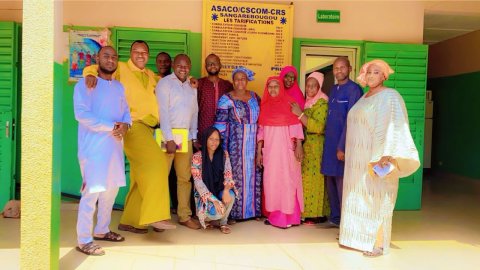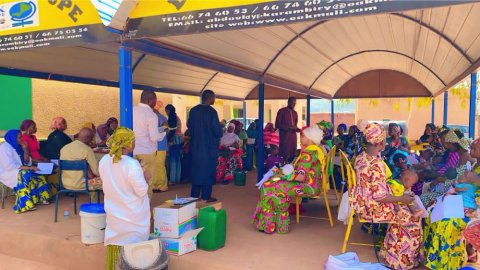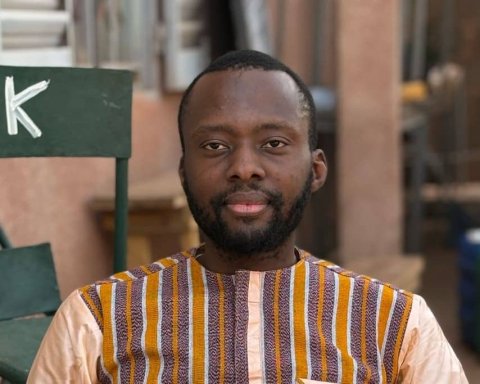Documenting the feasibility of an SMS and voice call-based solution to improve maternal health in Mali

RSTMH/NIHR Early Career Grant Awardee 2023, Dr Mahamadou Kante, writes about his own experiences with the grant and his research project, which went on to him publishing his research in BMJ Open.
This blog outlines our research journey funded by the RSTMH Early Career Grant, documenting the feasibility of an SMS and voice call-based intervention aimed at improving antenatal care attendance in Mali — a country facing significant maternal health challenges. Messages and calls, including recordings in the local Bambara language for participants who could not read French, were developed with the active involvement of the local authorities and healthcare staff. Our systematic review published in BMJ Open lays the groundwork for this innovative approach.
Maternal health in Mali remains critically challenged, with a maternal mortality rate of 562 deaths per 100,000 live births, over 80% of which are preventable. Given Mali's vast geography and limited healthcare resources, with only six healthcare professionals per 10,000 inhabitants compared to the WHO standard of 23, timely access to antenatal care (ANC) is particularly challenging.

With the support of the RSTMH Early Career Grant, our research focuses on documenting the feasibility of designing an SMS-based application to improve ANC attendance rates. This process began by systematically reviewing existing mobile and SMS-based maternal health interventions, published in BMJ Open. This literature review identified effective practices and informed strategic guidelines for developing tailored solutions.
Following the literature review, we conducted interactive workshops involving healthcare professionals, gynaecologists, and pregnant women with a facilitation team of my social scientist colleagues from the Institut des Sciences Humaines (Bamako). These workshops employed a design-and-creation research method, providing insights into local antenatal care challenges and ensuring that the SMS app was relevant and user centred.

The team, comprising five members, conducted the first workshop guided by a structured questionnaire divided into five sections. Section 1 aimed to understand the needs for ANC, while section 2 explored the general utility of SMS-based solutions in healthcare. Section 3 focused on debating the functional requirements and design preferences of an SMS-based ANC system. Section 4 addressed the challenges and obstacles associated with implementing and adopting such a solution. Finally, Section 5 gathered additional information and suggestions from the participants.
The participants included the Chief Medical Officer (CMO) of the rural area Sangarebougou Community Health Center (CSCOM), a specialist gynaecologist, the main midwife and her entire staff (two midwives, three obstetric nurses, two traditional birth attendants, and several volunteers), and pregnant and breastfeeding women. This workshop included more than 50 participants.
The analysis of the workshop data revealed that effective ANC according to the participants requires regular medical check-ups, financial support mechanisms, good communication between patients and medical staff, and accessible information. The SMS-based system should offer customisable reminders and practical advice, and ensure the confidentiality and security of patient data. A multichannel approach, including voice messages and traditional media , could improve accessibility and engagement. With a user-centred approach in mind, we considered including voice messages (in the form of pre-recorded messages in local language(s)).
In partnership with Savana Signature from Ghana, we developed a functional prototype tailored specifically to Mali's healthcare context. The system delivers weekly SMS messages (in French) and voice calls to women who are unable to read. The messages were categorised into reminders (appointment and medication reminders), health education (covering foetal development, women’s health during pregnancy, and health-seeking behaviour), and the importance of support systems from partners, family, and friends. Example messages include appointment reminders like "N'oubliez pas votre rendez-vous prénatal cette semaine" and health education prompts such as "Votre bébé commence à bouger! Continuez à manger équilibré pour soutenir son développement."
Feedback obtained from the demonstration and evaluation workshop led to essential adjustments, enhancing the usability and effectiveness of the application. The final stage of the HealthyMaman project culminated in a public seminar titled 'Building Foundations for Maternal Health in Rural Areas: From Feasibility to Impact,' held on 28 February 2025 at the Institut des Sciences Humaines in Bamako, Mali. The event featured key presentations from local and international experts.
Kante provided an overview of the project's purpose, scope, and key findings, outlining the next steps for scaling and implementation. Professor Mats Målqvist from Uppsala University followed with a presentation on 'Sustainability & Equity in Global Health: Lessons for Maternal and Newborn Care,' emphasising how the HealthyMaman initiative aligns with broader global sustainability efforts. Dr Ousmane Diarra of the Sangarebougou Community Health Centre (ASACO) provided field-level insights into the current challenges in maternal and newborn care within the community context. Professor Laura Ann Twagira of Wesleyan University added historical depth to her discussion of the evolution of technology in maternal and child health in Mali. The seminar concluded with a dynamic panel discussion which explored the key themes of feasibility, sustainability, equity, and the role of technology in transforming maternal health outcomes.
Author bio: Dr Mahamadou Kante

Dr Mahamadou Kante specialises primarily in Behavioural Information security and holds a doctoral degree that focuses on understanding the dynamics of personal information disclosure on online platforms. A trained computer scientist and his academic and professional interests extend beyond technology, intersecting significantly with sociology and behavioural sciences. This intersection led him into ICT4D and the creation of information systems that are inclusive, impactful, and correspond to social and psychological human needs.
Kante's research covers public health issues. His current work emphasises improving antenatal care attendance through basic technological intervention. This multidisciplinary approach, which combines information security knowledge, technological proficiency, and public health advocacy, reflects Mahamadou's commitment to addressing pressing societal challenges.
Beyond academia, Mahamadou is passionate about capacity building and frequently leads workshops and training sessions on digital data collection, analysis, and dissemination. His spare time is used for boxing (pugilism). He continues to advocate for equitable healthcare access and strongly believes in the potential of technology to transform healthcare delivery systems in Mali and similar low-resource contexts.